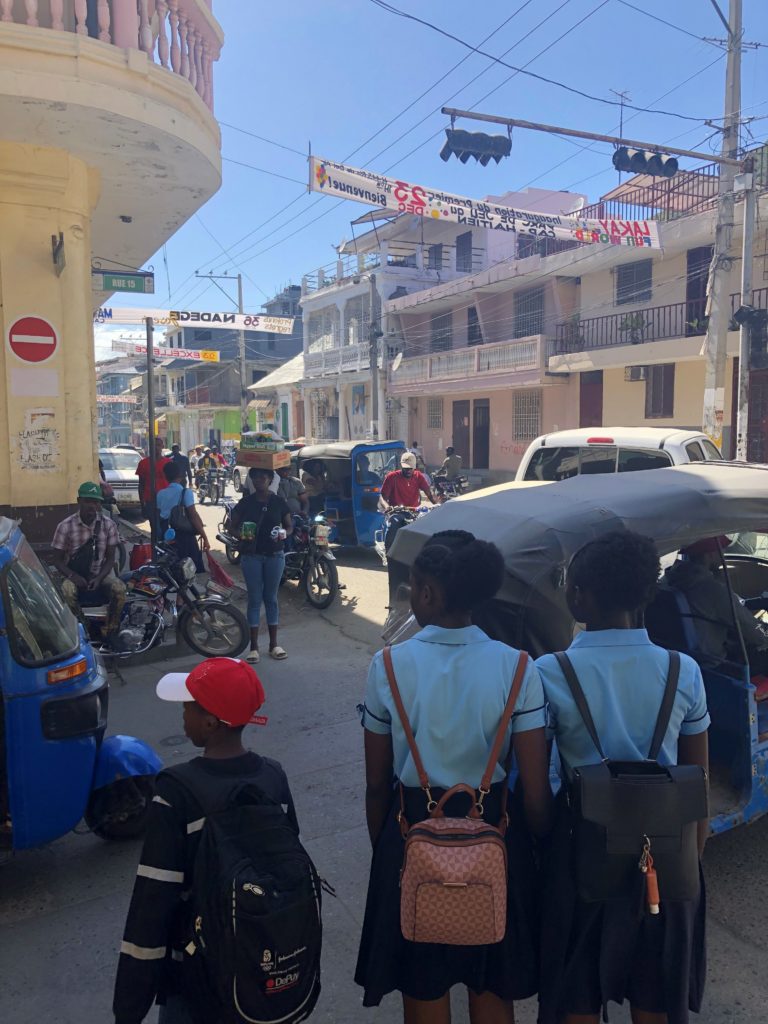However, there is also news of folks working hard and succeeding in making a positive difference, and I’ll send along three I’ve just received. The first, courtesy of Jerry Harner, under my signature, tells about the relative peace in Cap Haitien in the far north of Haiti, and about the good cooperative work of Konbit Sante, coordinating the medical services there.
***
News from Cap-Haitien, Haiti
Dear Friends,
I write to you from Cap-Haitien, where I recently returned after a few months in the U.S. As the violence in Port-au-Prince continues to escalate, Cap has remained relatively peaceful following a couple months of protest last fall.
Businesses and government offices are open, the streets are bustling again with children walking to and from school in their colorful uniforms, motos buzzing through the streets, and merchants selling their wares on sidewalks and in markets.
Cap-Haitien is considered such a haven that it hosted the Port-au-Prince International Jazz Festival in mid-January and will be the site of Carnival – one of the largest Mardi Gras festivals in the Caribbean and North America – in February.
The mood is one of gratitude and caution. As one of my colleagues said recently, “We feel blessed and thankful but also frustrated because of the bad news in Port-au-Prince.
The “bad news in Port-au-Prince,” as described in the international press, impacts every corner of the country, including cap-Haitien. Because gangs have blocked the Port-au-Prince fuel terminal and the major roadways into and out of the capital, the cost of black market fuel, food, bottled water, medicines, and other provisions has more than doubled.
Health centers in Cap-Haitien are struggling to run their generators and buy medicines and supplies. The lack of access to clean water is fueling an increase in cholera cases, and food costs are leading to food insecurity and higher rates of malnutrition, especially among children. My colleague, Dr. Rony Saint Fleur, reports an increased number of malnourished patients in the pediatric service at L’Hôpital Universitaire Justinien compared to one year ago.
Konbit Sante is responding to many of these challenges. As we reported previously, we have been working with partners Care2Communities and Second Mile Haiti to purchase and import one million Aquatabs water purification tablets. The tablets will be airlifted from Europe – where they are available at a significantly reduced cost compared to the U.S. – to Haiti in two weeks. Once they arrive in Cap-Haitien, community health workers will distribute tablets to households in the area. The health workers have done this before, there is a process in place, and the distribution can begin expeditiously.
In addition to distributing Aquatabs for prevention, we are searching for the best option to quickly (and at a reasonable cost) procure catheters, fluids, and other drugs and supplies for Hôpital Convention Baptists d’Haiti, which re-opened its cholera treatment center last week. At the same time, we continue to help partner facilities maintain and expand their solar capacity to remain less dependent on fuel to run generators.
We work in a complex, rapidly changing environment. Despite the challenges, I am pleased to be back with my colleagues and friends and in the city that has been my home for over a year. I look forward to working with our U.S. and Haiti teams, our generous volunteers, and our board to find creative and effective strategies to strengthen the health system in Cap-Haitien.
Sincerely,
Tezita Negussie
Interim Exeuctive Director

